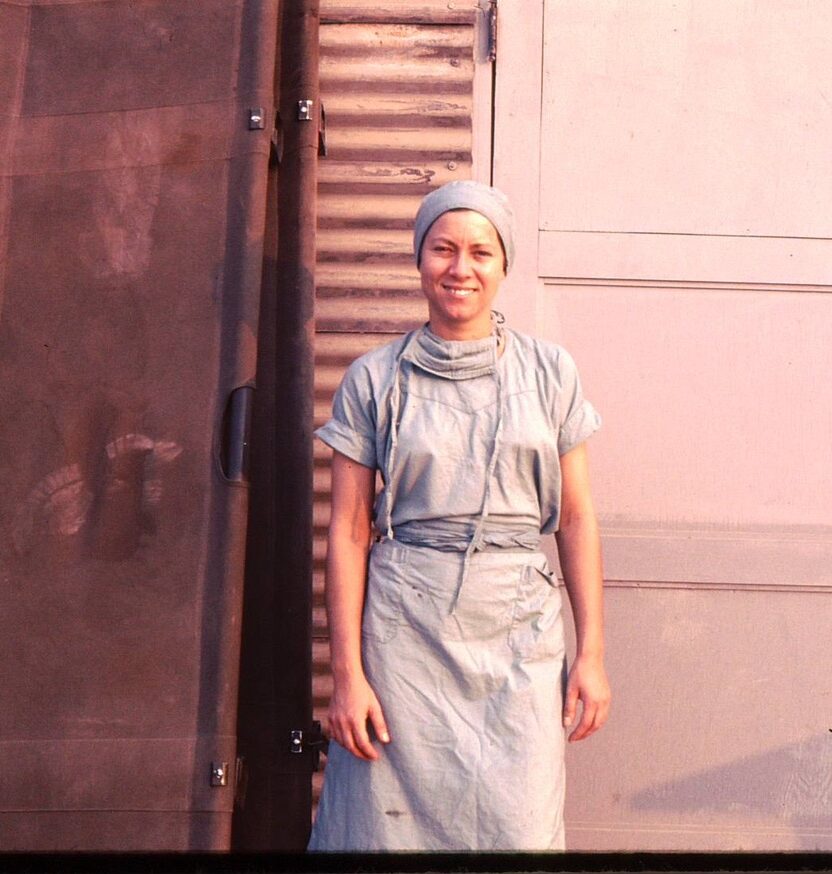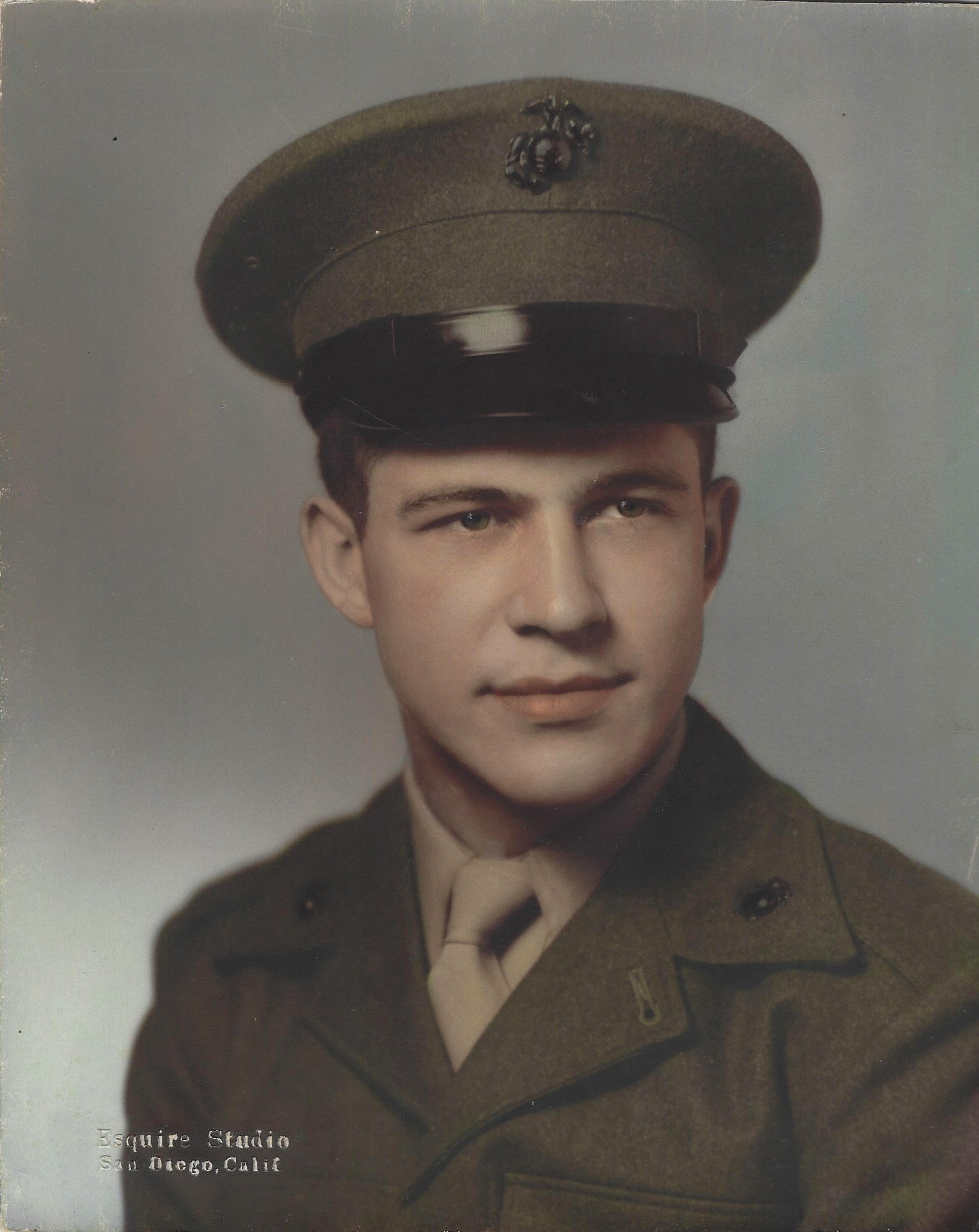His Name is Paul
By: Sarah L. Blum
Nurse Vietnam Veteran

Through that horrific year, 1967, the casualties came unceasingly. I never got to talk with them or get to know them. It pained me. As soon as they arrived on the operating room table they were anesthetized, while I was scrubbing in or doing some other task. I often asked my head nurse if I could go to triage’ or go to x-ray with one of them. One day I was given that opportunity and I have mixed feelings about it.
I was sent to x-ray with a guy named Paul, who had been hit by an RPG, rocket propelled grenade. He was hit in his abdomen. I stood beside him in x-ray and told him who I was and that I was there to support him before he came to the OR. He was in great pain even though the medic on the line had given him some morphine before the helicopter ride to our hospital.
I held his hand and tried to get him to be still on the x-ray table so they could get a good picture. He was very agitated and could not be still. He was terrified and thought he was going to die. I did not want to believe that. We were so good at what we did, I believed we could save them all.
When Paul was on the OR table, I was scrubbed in and Dr. Poticia opened up Paul’s abdomen. I never saw so much blood so fast from an incision. It came spurting and pouring out of him. There was nothing we could do. His vena cava had been ripped apart and the muscles, tissues, and skin had been keeping it under pressure inside him until we opened him up to repair what we could. We stood there helpless. He bled out on our table, and we were all speechless, and helpless. I believe I was in shock. Watching Paul die was one of the worst moments of my life. We failed him and lost him within two minutes. I learned the hard lesson that day, that we cannot save them all.
Paul knew and his body knew, he was going to die, and he too was helpless. I live with great sorrow for not getting to know him or being able to do something anything, to help him in his time of great need. Needless to say, I never asked to go with any casualty to x-ray after that. In my nursing career I have seen many patients die but I have only seen one young man die so quickly and needlessly at our hands. I will never forget Paul or those two minutes.
Submitted directly to the Journal for republication.
Thank you for sharing your story with us, Sarah
IF
“If we really saw war, what war does to young minds and bodies, it would be impossible to embrace the myth of war.
If we had to witness the mangled corpses of schoolchildren killed in Afghanistan and listen to the wails of their parents, we would not be able to repeat the clichès we use to justify war.
This is why war is carefully sanitized.
The wounded, the crippled, and the dead are, in this great charade, swiftly carted off-stage.
They are war’s refuse.
We do not see them.
We do not hear them.
They are doomed, like wandering spirits, to float around the edges of our consciousness, ignored, even reviled.
The message they tell is too painful for us to hear.
We prefer to celebrate ourselves and our nation by imbibing the myths of glory, honor, patriotism, and heroism; words that, in combat, become empty and meaningless.
Look beyond the nationalist cant used to justify war. Look beyond the seduction of the
weapons and the pornography of violence.
Focus on the evil of war.
War begins by calling for the annihilation of ’the others’ but ends ultimately in self-annihilation.
It corrupts souls and mutilates bodies. It
destroys homes and villages and murders children on their way to school.
It grinds into the dirt all that is tender and beautiful and sacred.
And before you support war, look into the hollow eyes of the men, women, and children who know it.”
-adapted from Death of the Liberal Class by Chris Hedges
In memoriam of all who lose to war
Blue Stars Turned Gold

By: Frank Burkett
Forward: While growing up in the 40s, I remember this so well that I wrote some words of rhyme about families, but especially for mother’s grieving.
Mrs. Hammett, FFA teacher of Southern Boone let me and two ladies host the program and I read it at the Veteran’s Assembly a few years ago. Younger U.S. citizens of today have no idea about Blue Star families of my day.
Blue Star families, and especially mothers, were proud but also lived in anxiety of their sons and daughters safety. You can observe the Blue Star Memorial placed at the southeast corner of our city’s park. Also you have seen them at all rest stops across our nation and at other places that honor Veterans too.
The Blue Star family was originally formed during WWII. The custom was for a family to honor their sons or daughters serving in the military by hanging a banner called a Service Flag in a window of their homes. The color of those banners were the colors of our Country’s Flag, Red, White and Blue. Living servicemen were represented by a Blue Star and those who had lost their lives or were missing in action were represented by a Gold Star.
Blue Stars Turned Gold
Oh, where do I start? Perhaps in October, 1912 when a brother was born, the first.
Then about two year intervals, through December 1932, there were nine more births.
There were six boys, four girls, and our family was nearly the largest family around, so far.
Fast forward to 1942 after WWII began, and my third brother became my Mother’s first Blue Star.
The next year, 1943, my Mother’s window now displayed three Blue Stars and one Gold.
In some windows there were two, three, or four Blue Stars, almost more than the banner could hold.
As months turned into years, the Blue and Gold Stars kept mounting. Oh, there were so many.
Because at the peak, a mixture of Stars numbered over sixteen million, which sounded uncanny.
There wasn’t a Star that distinguished the MIA from the KIA, so for both, they used Gold.
Many wounded servicemen and some women were awarded a Purple Heart for injuries untold.
The years, from 1941 and eight months into 1945, the Stars in the windows kept growing.
WWII ended in August and over 416,000 Blue Stars turned Gold, and mothers were grieving.
Then about five years later, another conflict brought out the banners again, it was called “Police Action.”
Blue Stars appeared in windows again, and as before, some turned Gold all across the nation.
The only one that got a parade and confetti was General MacArthur, that Harry Truman fired.
Korea was called “The Forgotten War” except to the mothers of 54,236 soldiers that had expired.
This was a conflict that was supposed to hold communism in check but it was just another war.
My brother and I added to my Mother’s banner, and if still counting, was five Blue and one Gold Star.
Harry Truman first sent advisors to Indo-China, which became Viet-Nam, so in 1950, they went forth.
Then President Dwight D. Eisenhower sent more military advisors and Special Forces to train the South.
John F. Kennedy sent more military, increasing to over 11,000 in 1961, and the conflict began.
Lyndon Johnson perpetuated the conflict into an all-out war, one that we wouldn’t win.
But more Blue Stars were affixed on banners in windows across the country, then more tears,
As Blue Stars numbering 58,310 turned to Gold in a conflict that lasted 180 days and nine years.
Korean and Vietnam Veterans weren’t held in high esteem by the citizenry, except by a few,
But thanks to Mary and Steve Paulsel, who began the Central Missouri Honor Flight, that finally gave us our due.








Facebook Comments